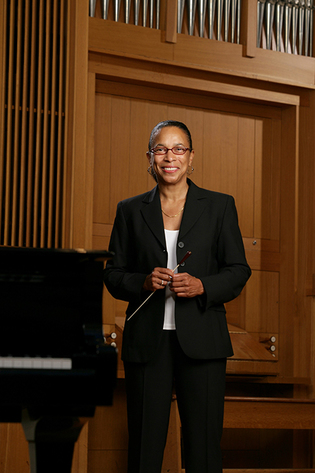
Courtesy Kay George Roberts
Kay George Roberts
Conductor
By Matthew Guerrieri
Asked to name a particularly memorable performance, conductor Kay George Roberts demurs. “That would be like choosing one child over another,” she says. The performances have been so many: old music and new, touring globally and building locally. Roberts ’76MMA, ’86DMA—the first woman to earn a Yale doctorate in conducting—didn’t have the open path many conductors have enjoyed: “As an African American woman, I found myself a minority within a minority.” So she paved her own way.
Roberts grew up in Nashville, surrounded by both discrimination and historical Black excellence. Her parents worked at Fisk University—her father a psychology professor, her mother a librarian. Roberts’s segregated elementary school had a band but no orchestra. But she caught the attention of Robert Holmes, a soul and R&B songwriter who founded the Cremona Strings to give Black youth musical opportunity. Holmes “handed me a violin,” Roberts says, “and that was the beginning.”
Roberts eventually secured a violin chair in the Nashville Symphony. A summer at Tanglewood—and the experience of performing Anton Bruckner’s Ninth Symphony with Leonard Bernstein on the podium—convinced her: “I decided then and there that music was to be my field.”
At Yale, Roberts earned two degrees in violin, but a conducting elective with Otto-Werner Mueller, the German-born maestro who led the Yale Philharmonia, changed her path. Imposingly tall and uncompromisingly exact, Mueller had an eye for talent. “He must have seen something,” she says, “because he insisted I should become a conducting major.” She worked with him for three years and found her calling.
From the outside, Roberts’s success was immediate. She returned home for her 1976 professional debut: conducting the Nashville Symphony in a concert in Centennial Park. It was a place that had been closed to her as a child by segregation. She would guest-conduct major orchestras in the US and Europe for the next three decades. But she would also feel isolation and barriers: “There were almost no women conductors in the professional ranks.”
Roberts moved in 1978 to Lowell, Massachusetts, a city of immigrants old and new. She joined the faculty of UMass Lowell, became conductor of the orchestra, and formed a long-term association with a community of musicians and listeners. She founded the UMass Lowell String Project, putting instruments into the hands of local schoolchildren just as Robert Holmes had done for her: “I wanted to give back what’s been given to me.” She started the New England Orchestra, giving students and professionals the chance to make music side by side.
Roberts brought together members of Lowell’s Cambodian, Brazilian, and African communities for a celebration of complementary traditions. She helped bring to fruition an opera about the 1970s Cambodian genocide that sent great numbers of immigrants to Lowell. She led musical celebrations of two of Lowell’s most famous sons: George Chad-wick, the dean of Romantic Boston composers, and Jack Kerouac, the soul of the Beats.
A trailblazer by necessity, Roberts embraced the role, bringing the music of American composers abroad and championing Black and women composers at home. She has viewed her role as “in the broadest sense, one of an educator.” She doesn’t mention opening minds. But along the way she must have opened thousands.
 loading
loading